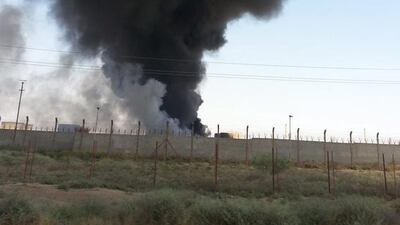Fears that the Islamist-led insurgency in Iraq could incite an oil price shock increased as fighting continued yesterday for control of the country’s biggest oil refinery.
Fighters from the Islamic State of Iraq and the Levant (ISIL) launched an attack on the Baiji refinery in northern Iraq last week as part of a wider insurgency that has also seized the second city of Mosul.
Economists fear that global oil prices could jump to as much as US$140 a barrel if oil production levels in Iraq fall because of the violence – a new threat to the global economy.
Oil prices have jumped nearly five per cent since June 10, when ISIL fighters seized control of Mosul. Brent crude, the global oil benchmark, topped $115 a barrel for the first time since September on Thursday after the US president, Barack Obama, said that American troops would not return to combat in the country.
Julian Jessop, the head of commodities research at Capital Economics, said that if the Iraq crisis continued, oil prices would likely increase to about $120 a barrel – a level that has previously been followed by a slowdown in the global economy.
“At the very least, it is hard to see a strong and sustained global recovery as long as oil prices are above $100 [a barrel],” said Mr Jessop. “If the crisis in Iraq worsens, instability could increase further in other parts of the Middle East. In these circumstances, it would not be difficult to imagine the price of Brent surging to new record highs above $140.”
However, he added that if the Iraq crisis ended quickly, the most likely outcome would be that oil prices would fall below $100 a barrel over six to nine months – a level not seen since the start of the Arab Spring in 2011.
Iraqi officials have repeatedly sought to assure international markets that the crisis, which has been mainly concentrated in the north, will not affect oil exports, which mostly come from southern Iraq.
“So far, it appears that there has not been an effect on production,” said Sarah Haggas, the regional manager for the Middle East at IHS Energy.
“The key producing fields are predominantly located in the southern Iraq, particularly in Basra Province. The field with the highest production, Rumaila, is located here. The main producing field in the north is the Kirkuk field, however lately production has been reduced because of the Kirkuk-Ceyhan pipeline being out of operation for several months [because of repeated attacks].”
Last week a report from the International Energy Agency warned that the Islamist insurgency was putting at risk a predicted 1.2 million barrel per day increase in the amount of crude oil that can be produced by Iraq – a country that was expected to account for as much as 60 per cent of Opec’s new capacity over the coming five years.
Last week, Morgan Stanley reported that it was overweight on oil and gas companies operating in Iraq’s semi-autonomous Kurdish region, whose peshmerga forces recently took over Kirkuk. Kirkuk has a multi-ethnic population and vast oilfields.
In a note to clients, analysts at Morgan Stanley initiated coverage on DNO with equal weight, and Gulf Keystone underweight. Meanwhile, it upgraded Genel to overweight “given its attractive valuation and position to benefit from the Kurdish Regional Government’s evolving circumstances”.
lbarnard@thenational.ae
* Additional reporting by Hadeel Al Sayegh
Follow us on Twitter @Ind_Insights

